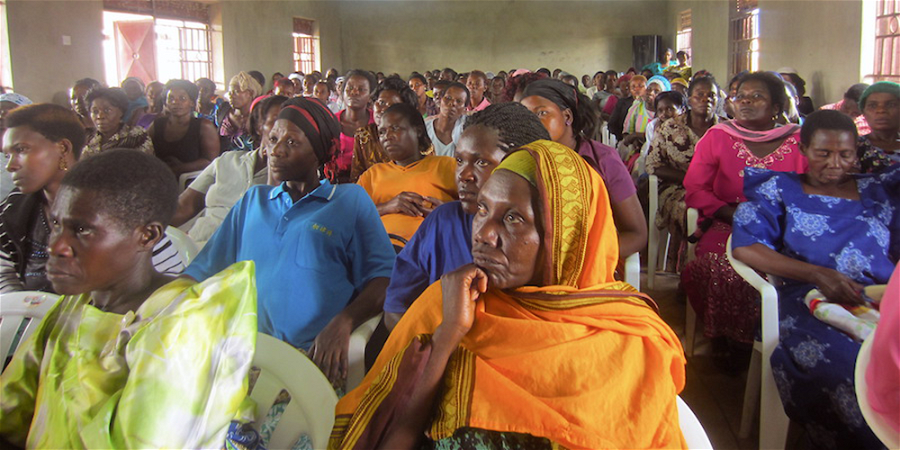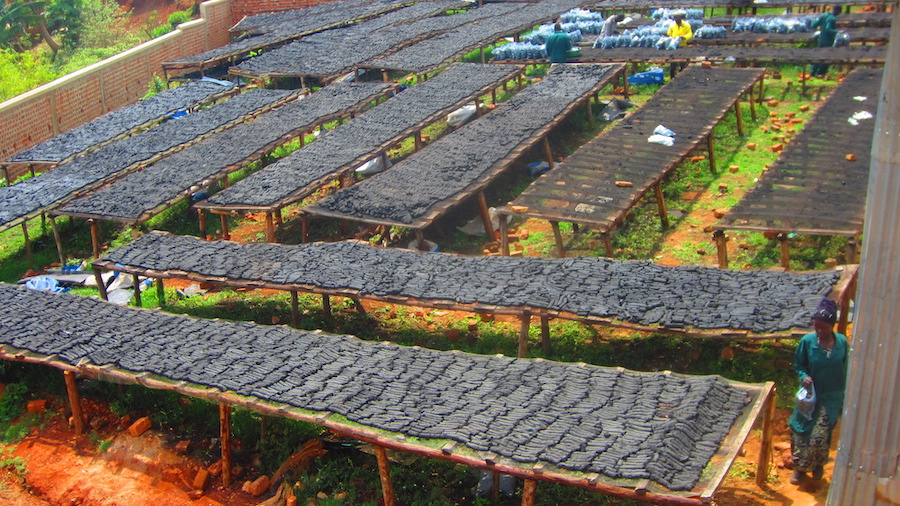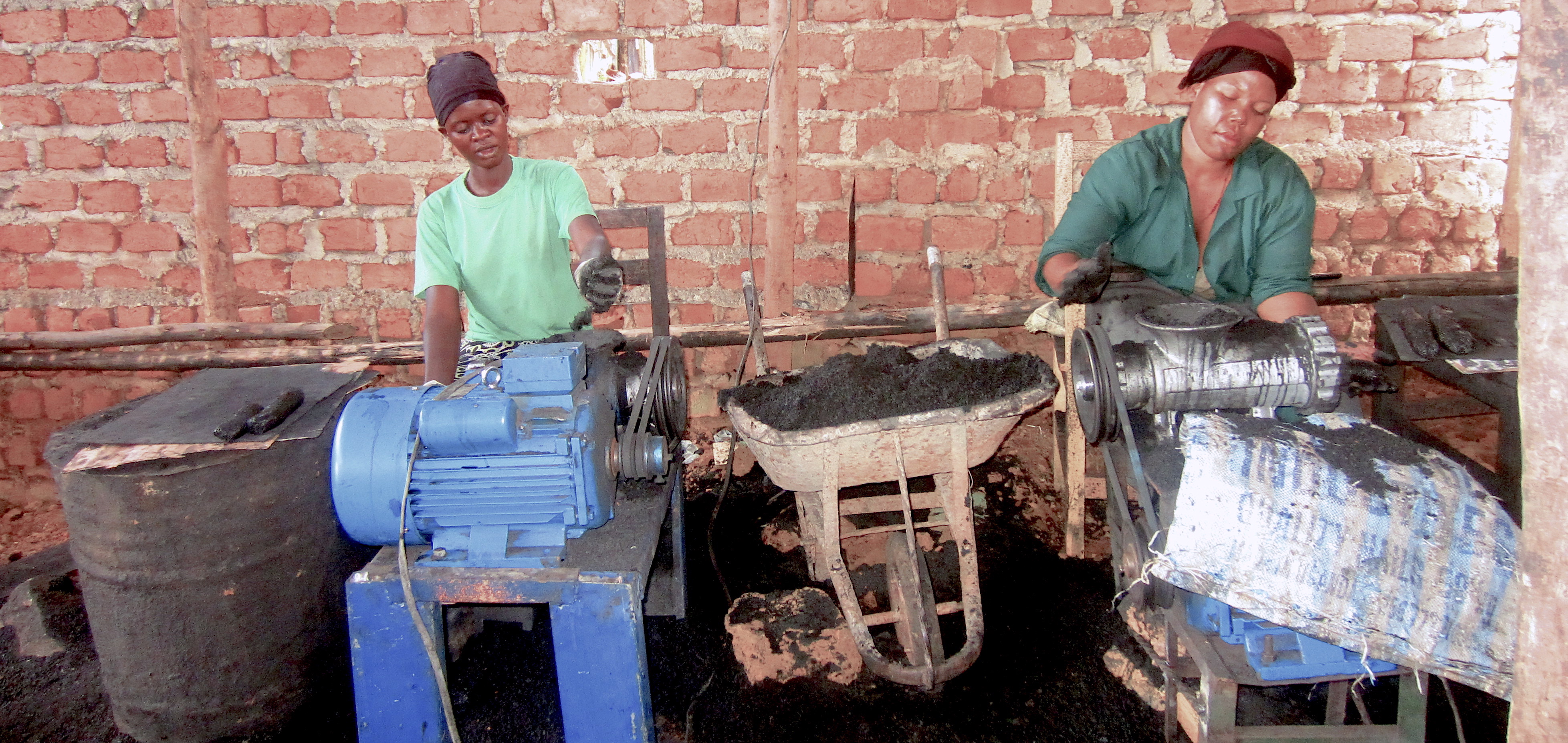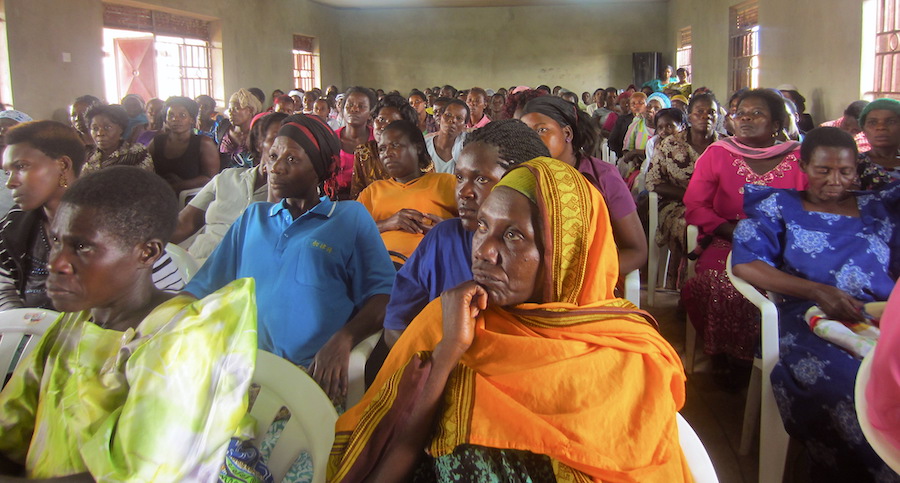Sanga Moses, Ugandan creator of Eco-fuel Africa
Mar 02, 2021
Tell us about how you got started.
In January, 2009, I travelled from Kampala, the capital city of my native country, Uganda, where I worked as an accountant in a top bank to go and visit my mother in my home village in Western Uganda. On my way home, I met my 12-year-old sister carrying a huge bundle of firewood on her head.
She had missed school that day and walked for 10 kilometers to gather firewood for my family. When my sister saw me, she started crying and told me that she was tired of missing school to gather wood. This troubled me so much because I was paying school fees for my sister and wanted her to get an education. I immediately decided to quit my secure job with just $500 in savings to totally focus on finding a solution to overdependence on fuel-wood in Uganda. Everyone thought I was crazy! I spent a full year researching possible solutions until I realised that I could turn agricultural waste which is abundant and just wasted in Uganda into clean burning fuel briquettes.
I sold all my personal belongings including my bed to build the first kiln and make the first briquetting machine and in April, 2010, we launched Eco-fuel Africa and in November, 2010, Eco-fuel Africa brought its first product to market.
What makes your company unique?
The art of making briquettes and stoves has been around for many years. However, these technologies had not taken root in Uganda because they were not affordable to most Africans and also were not easily accessible to the majority of the people who live in villages. These are the challenges we have solved.
We’re the first organization to democratise briquettes and energy saving stoves production in Africa. The uniqueness of our model lies in the fact that we have empowered marginalised villages in Africa (some of which are too remote to even be accessed by a motorcycle) to produce their own clean cooking fuel and energy saving stoves using locally sourced organic waste. This is making these villages self-sustaining, creating local jobs, reducing deforestation, indoor air pollution and keeping girls in school in these villages.

Secondly, our sustainable and creative financing model is also disruptive and transformative. The biggest problem in Africa is access to affordable capital especially for people at the base of the pyramid particularly women and youths who do not own any assets that they can use as collateral for loan from financial institutions. We solved this problem through our an innovative, sustainable and scalable revolving loan fund which provides low-cost start-up capital to marginalised women groups to enable them launch village-based micro-factories that convert locally sourced organic waste into clean cooking fuel called green charcoal and energy saving stoves. This enables marginalised women to own their own businesses, creates local jobs, saves forests, reduces CO2 emissions, reduces indoor air pollution, keeps marginalised girls in school and creates cleaner and more sustainable communities in Africa. This is therefore changing lives and empowering communities. For example, over 250,000 marginalised girls in Uganda alone have been enabled to go to school for the very first time. Therefore, we’re breaking generations of poverty.
Thirdly, people in East Africa have easily adopted our green charcoal and stoves because unlike other alternative solutions like solar ovens and LPG gas, our green charcoal and stoves, look like the dirty charcoal from wood and inefficient stoves they have been using for generations. So, people feel like they are not significantly changing how they have been cooking for generations and they are normally excited about the additional benefits of our products like our green charcoal being less smoky and costing 50% less than charcoal from wood.
No business is without setbacks, can you tell us about a time when you faced a significant setback and how you recovered from it?
In 2014, we faced a problem of raw-materials. We scaled to the level where the raw-materials in the areas where our factories were based were no longer adequate to sustain our production capacity. We tried collecting raw-materials from distant villages but we faced the challenge of bad roads and in some cases, no roads at all. This slowed down our expansion capacity, increased our production costs and our profitability.
To overcome the above challenges, we decided to decentralized production to eliminate the need to transport raw-materials over very long distances and this is how we changed our model from centralized production facilities to village-based decentralized micro-facilities that are owned and managed by local communities. These facilities locally source raw-materials and sell the final products (briquettes and stoves) locally. This eliminates the need to transport both the raw-materials and final products and hence keeps the prices down and eliminates carbon emissions from old diesel or petrol trucks normally used to transport goods here in Uganda.

How do you define success and to what do you attribute your success?
We define success by measuring the number of people enabled to access our clean fuel, jobs created and number of marginalized girls enabled to stay in school. Currently, we have created over 6,114 village-based, women-led micro-franchises which currently bring clean energy to over 1,528,500 marginalised households on a daily basis and have created over 217,500 direct jobs for people at the base of the pyramid particularly marginalised women and youths in East Africa. We have also enabled over 246,500 marginalised girls to join school for the first time. These girls are also able to consistently attend school.
We attribute our success to the fact that we our products address real needs of the communities we serve and the fact that people feel as part of our project. We therefore have a lot of good will in the communities where we work.
What's next for your business, what will it look like in 5 years?
Now that we have scaled in Uganda, we have started expanding to other East African countries. We decided to scale to Kenya in March, 2020 but we were slowed down by COVID-19. However, we have now completed all arrangement to finally launch in Nairobi beginning with Kibera Slum. We also have plans to launch in Tanzania and South Sudan in the next 5 years.
What do you think the future holds for Africa-focused entrepreneurs and advice do you have for entrepreneurs who are just starting out?
The future of entrepreneurship in Africa is bright. It can only continue to improve and my advice to entrepreneurs who are just starting out is to network with the right people, work really hard and be patient. You will finally make it.

Owning a business while balancing a personal life can be challenging; how do you take care of yourself?
I exercise for at least 6 days a week and take off one day every week to spend sometime with my family. I am also a practicing Christian and get strength from reading the bible, prayer and meditation.
What is your favorite quote or mantra? What keeps you going?
“If you’re going through hell, keep going.” –Winston Churchill, British Prime Minister
What is your favorite app or a business tool that you can't live without
Zoom. It is now even more useful because of COVID-19